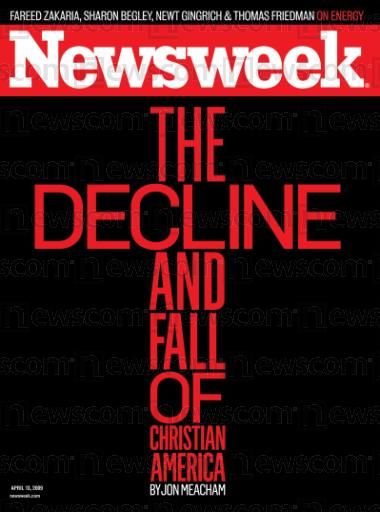Both the Christian and secular media worlds are ablaze as Jon Meacham’s article The End of Christian America makes its rounds.
From the blogosphere this morning:
Well, I thought of the wrath God must feel for those arrogant blasphemers who reject His law and I also thought about how righteous His judgement will be.
—Shotgun Smith on his response to “some woman in Australia who thought that the death of Christianity was undoubtedly a good thing.”
 Easy there, turbo. I’m guessing you didn’t read the entire article, as I suspect many of your Christian brethren won’t. To say the article is about the “death of Christianity” is incorrect and a bit pessimistic.
Easy there, turbo. I’m guessing you didn’t read the entire article, as I suspect many of your Christian brethren won’t. To say the article is about the “death of Christianity” is incorrect and a bit pessimistic.
From page 36: “Let’s be clear: while the percentage of Christians may be shrinking, rumors of the death of Christianity are greatly exaggerated.”
The article actually discusses the decline of Christianity in our country and theorizes that this has occurred due to the lack of distinction between church and state.
While arguing that the influence of either too much secularism or too much religion creates imbalance in the political system, Meacham reminds the reader that “As crucial as religion has been and is to the life of the nation, America’s unifying force has never been a specific faith, but a commitment to freedom – not least freedom of conscience.” In simpler terms, our Founding Fathers neither envisioned nor intended to create America as a strictly Christian Nation, but rather as one in which each citizen had freedom and liberty.
I infer from this that the author sees a correlation between Christianity’s decline and how religious conservatives have long used politics to force their morals and values on the public. It’s easy to see why secular society, resenting attempts by Christian political leaders to forcibly remove Constitutional liberties (a woman’s right to choose, the right of same-sex couples to wed, the need for stem cell research funding, etc.) would want to distance itself from Christianity.
I also speculate that though they may never realize it, the Christ-Con’s sole saving grace is their failure to accomplish their over-arching aim: to rebuild the bulwark of 1950’s Christian America. Had they succeeded in stamping out all beliefs and practices that don’t coincide with their own, it wouldn’t be long before another group rose to power and did the same to them. And schadenfreude aside, that would be a bad for us all.
Oppression of anyone is oppression of everyone.
–Stevie Wonder







